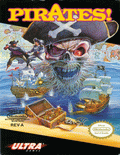
































Sid Meier’s Pirates!

Sid Meier’s Pirates! is a video game created by Sid Meier and developed and published by MicroProse in 1987. It was the first game to include the name 'Sid Meier' in its title as an effort by MicroProse to attract fans of Meier's earlier games, most of which were combat vehicle simulation video games. The game is a simulation of the life of a pirate, a privateer, or a pirate hunter in the 16th, 17th and 18th centuries.
Pirates! is set in the Caribbean. The Pirates! playing field includes the Spanish Main (namely the northern coast of South America), Central America and the Yucatán Peninsula, the entire Gulf of Mexico, Florida, and all Caribbean islands, plus Bermuda. The player is free to sail to any part of the above-mentioned lands, stopped by an invisible barrier southeast of Trinidad, all the way north to just northeast of Bermuda.
The game was widely ported from the original Commodore 64 version to numerous other systems. The Pirates! Gold remake, with minor improvements and better graphics, was released in 1993. An enhanced remake, also named Sid Meier's Pirates!, was released in 2004. Versions for mobile devices have also been released.
Pirates! is a single-player, open-world game. The player receives a letter of marque authorizing service as a privateer for the Spanish Empire, the Dutch Republic, the Kingdom of England, or the French colonial empire in the Caribbean. The player's loyalties may change over the course of the game; they may also hold rank with multiple countries and may turn to piracy at any time. Gameplay is open-ended; the player may choose to attack enemy ships or towns, hunt pirates, seek buried treasure, rescue long-lost family members, or even avoid violence altogether and seek to increase their wealth through trade. The game also has no predetermined end, although as time goes on, it becomes more difficult to recruit crew members. As the player character ages, fighting becomes more difficult, and deteriorating health will eventually force the character into retirement. The game ends when the player retires, at which point they are given a position in their future life, from beggar to King's advisor, based on accumulated wealth, land, rank, marital status, and other accomplishments.
The era of play is one of the choices given to a player at game-start. Different eras provide a different challenge, as political and economic power shifts between the four fledgling European empires. Choosing 1560 (the earliest choice) as the starting year places the player in the Caribbean almost devoid of influence but that of Spain, while 1680 (the latest choice) provides a mature Caribbean with many non-Spanish colonies and an overall higher degree of activity in the region. The other choices include 1600, 1620, 1640, and 1660, with the progressive effect of reducing Spanish dominance in favor of the other nations, while increasing seafaring traffic. Ship designs are also era-dependent, with some types of ships appearing more frequently in certain eras and less in others, and certain ship types being used near-exclusively by certain nations.
The game tests a wide range of skills: hand-eye coordination during the fencing sections, tactical ability during the land and sea combat phases, and strategic thinking, for everything from choosing a wife to deciding when to divide up the plunder. Moreover, each game is likely to take a different course, as most events in the game are random, including the economic and political systems, and early in the game, these can greatly affect future strategic options. In the course of the game a player may try to tack in a frigate in order to run down a smaller and faster pinnace, but must be fortunate enough to have the weather gage.
One of the most innovative features of Pirates! is the introduction of a dynamic playing field. In Pirates! many of the most important factors which affect player decisions are randomized at the beginning of the game and continue to shift during gameplay. This not only creates a new experience each time the game is played, but also requires the player to remain flexible, and be ready to exploit possibilities when they occur. Changes happen whenever time passes and they are unrelated to player actions. In fact, in this game in the series, random events do not have any graphical representation, and the player can do nothing to prevent them.
The most important random factor in the game lies in the diplomatic relations between the four nations laying claim to the Caribbean. Relations may differ greatly from game to game, and can shift in an instant, creating and removing opportunities, possibly even for long periods of time. The player generally benefits from periods of war between two or more countries, because any aggression towards a country's ships or cities, which occurs often if not specifically avoided, will gain recognition with its enemies, prompting them to bestow the player with land, titles, and other benefits. During peacetime, the player can only benefit from the capture of pirates on the high seas, which is seen as favorable by all nations, but is a rare occurrence.
Cities are also dynamic, with statistics like wealth and population fluctuating constantly. The player has a list of cities in one of the game's menus, allowing him to see the statistics of any city. Knowing the statistics of a city helps the player plan ahead, especially with regards to trading or any desire to raid or conquer cities.
The original versions of Pirates! sported both disk and manual copy protections. Users were asked the time at which various treasure ships were arriving at the port. If the time was wrong, the game would continue, but at a much higher difficulty level that would frustrate most people.
How to play:
Click on the joystick icon in the Sid Meier’s Pirates! online emulator to see how to control the Sid Meier’s Pirates! game









































Comments